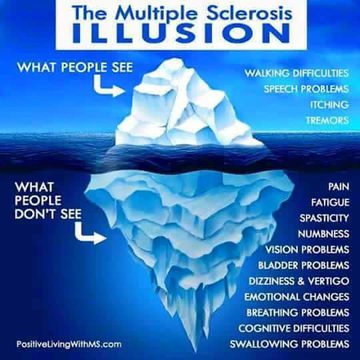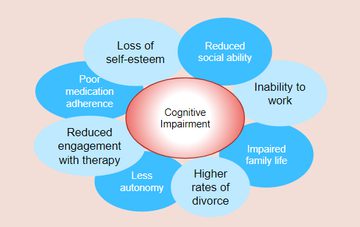World Mental Health Day: supporting people with neurological conditions in the workplace
NewsThank you to Dr Blanca De Dios Pérez for contributing to this article
The theme for this year’s World Mental Health Day is around ‘workplace mental health’. The World Health Organisation (WHO) states that more than half the world’s population are currently in work and 15% of working-age adults live with a mental disorder. Without effective support, mental disorders and other mental health conditions can affect a person’s confidence and identity at work, capacity to work productively, absences and the ease with which to retain or gain work. Twelve billion working days are lost every year to depression and anxiety alone (Mental health at work, WHO).
Mental health conditions and neurological disorders can both affect thoughts, emotions, behaviours, and relationships. In fact, mood disorders like depression are common in people with neurological disorders like multiple sclerosis, dementia, and epilepsy.

Improved mental health in the workplace can positively impact an organisation’s culture and improve performance outcomes by reducing stressful conditions. In particular, supporting people with visible and invisible neurological conditions in the workplace by meeting their needs and promoting an open space for communication can foster a culture of trust where all employees are able to express their needs and support each other to reach their maximum potential.
Examples of approaches to improving mental health at work for those with neurological conditions include:
Encourage conversations about mental health and create open spaces for people to share their thoughts when they are going through a difficult time.
Implement inclusive policies that allow people to work flexible working hours, allowing them to balance personal and professional responsibilities during challenging times.
Offer training to managers and staff to recognise when someone is experiencing mental health difficulties.
Raise awareness about neurological conditions and visible and invisible symptoms to reduce the stigma around working with an illness or disability.

The Hidden Disabilities sunflower is starting this conversation, they have created the sunflower to encourage inclusivity, acceptance and understanding. Their aim is to be there every day of the year to support people living with non-visible disabilities in their communities by raising awareness, training businesses and sharing stories to help create a more inclusive, understanding society. Making invisible disabilities visible. What is the Hidden Disabilities Sunflower?
For further reading: Skin-Deep: Not all disabilities are visible

People with a long-term neurological condition will struggle with both mood disorders and cognitive impairment, the blurring of lines (figure 1) between these without adequate assessment and treatment is clear.

Figure 1 - The blurring of lines between mood disorders and cognitive impairment for people with a long term neurological condition
The prevalence of cognitive impairment in MS, as an example, is around 46%, this ranges from 36% to 92% in more advanced disease. Lifetime prevalence of depression in MS approx 50% compared with around 15% in the general population. Lifetime prevalence of clinical anxiety in MS is 20%, and in the general population it is around 6%.
The evidence for the role of lifestyle behaviours in risk and management of neurological disorders continues to grow, likely acting concurrently for optimal benefits. Indeed, multimodal lifestyle behaviours, combining healthy diet, increased exercise and cognitive training, have shown improved cognitive outcomes in at-risk elderly people and people with MS (Assessing Lifestyle Behaviours of People Living with Neurological Conditions: A Panoramic View of Community Dwelling Australians from 2007–2018 - PMC).
The impact from cognitive impairment (figure 2) affects all areas of a person's life, including work, family life, engagement with healthcare and ability to socialise. It is key as healthcare professionals that we acknowledge limitations to current services but signpost patients to support available and highlight to managers that this is a priority area for development.
One example of how simple assessment may be able to make a difference in long term monitoring of cognitive changes for people with MS was this project Setting up a pathway to improve management of cognitive impairment in people with MS using screening with the Symbol Digit Modality Test prior to referral to neuropsychology. The authors looked at the use of the Symbol Digit Modality Test as part of the annual review so monitor change over time to see if it would help with identifying when a pro-active discussion around modifying their role may be needed to prevent a person leaving their job.

Figure 2 - The impact of cognitive impairment in MS (Portaccio E & Amato M Cognitive Impairment in Multiple Sclerosis: An Update on Assessment and Management)
The MS Society have funded a project looking at who would benefit from cognitive rehabilitation, Determining who benefits most from cognitive rehabilitation | MS Society. Memory, attention, and problem solving (together known as ‘cognitive’ problems) affect up to 70% of people with MS. These problems are distressing for people with MS (and their families), affecting their mood, ability to work, and enjoy social activities. Therefore, treating cognitive problems is a ‘top 10’ research priority for people with MS. The NeuroMS team are looking at the problems and ways to do this better, specifically neuropsychological evaluation and rehabilitation (Neuroms).
The WHO have recently published Mental health at work WHO 2024 which outlines key facts, background, problem and ideas for a solution.
So protecting and promoting mental health at work is about strengthening capacities to recognize and act on mental health conditions at work, particularly for people responsible for the supervision of others, such as managers.
To protect mental health at work in the future, the WHO recommends:
manager training for mental health, which helps managers recognize and respond to supervisees experiencing emotional distress; builds interpersonal skills like open communication and active listening; and fosters better understanding of how job stressors affect mental health and can be managed;
training for workers in mental health literacy and awareness, to improve knowledge of mental health and reduce stigma against mental health conditions at work; and
interventions for individuals to build skills to manage stress and reduce mental health symptoms, including psychosocial interventions and opportunities for leisure-based physical activity.
For people with a neurological condition
Here are some resources for support for people with invisible disabilities in the UK:
Hidden Disabilities Sunflower: A voluntary tool that allows people with hidden disabilities to discreetly indicate that they may need help, understanding, or more time. The sunflower can be worn as a lanyard, badge, ribbon, card, or wristband. Staff are trained to recognize the lanyards and offer assistance.
Cam Invisible Illnesses and Friendship Group: A support group for people with hidden illnesses or disabilities.
Hidden Disabilities Charity UK: A charity that provides awareness and other support.
Benenden Health: Offers tips for supporting people with invisible disabilities in the workplace, including encouraging open conversations and establishing a company policy for regular meetings.
FDM Group UK: Provides support for invisible disabilities in the workplace.
There are a number of support options available in the UK for people with disabilities and work, including:
- Access to Work
A publicly funded program that can provide financial and practical support to help people with disabilities start or stay in work. Support can include grants for equipment, adaptations, and support workers, as well as help with travel costs and mental health.
- Jobcentre Plus
Can arrange interviews with work coaches who are trained to help people with disabilities find suitable jobs.
- Disability Confident schemes
Employers who use these schemes offer interviews to all disabled applicants who meet the minimum job criteria.
- Action On Disability
Offers employment services, including advice and guidance, and can help people get trial positions.
- Scope UK
Offers online advice and support, including the Leeds Community Hub.
Disease specific charities - for example Parkinson’s UK, MS Society, MS Trust, PSP Association, Shift.ms, Epilepsy Action.
Other support options include:
- Universal Credit, which can top up a low salary
Reasonable accommodations, such as flexible work arrangements, remote work, or part-time positions
For healthcare professionals
Healthcare professionals play a vital role in supporting the physical, mental and emotional health of our nation and with the rising incidence of a range of long term conditions, this is increasingly needed. But who is supporting their health? The NHS is currently experiencing some of the most severe pressures in its 70-year history, and the most reported reasons for sickness absence across all staff groups are anxiety, stress, depression and other psychiatric illnesses.
Last year, we developed a free, online course for anyone working in healthcare who wants to focus on their own health and wellness, whether to prevent, manage or recover from burnout, to invest in their future health, or to gain a better understanding of how lifestyle changes can impact our overall wellness.
Find out more: ‘Health & wellness: taking care of ourselves and those around us’
Related articles
Uniquely practical education, producing specialist clinical leaders transforming local healthcare
Neurology Academy is an innovative educational provider for healthcare professionals including consultants, specialist nurses, pharmacists, therapists and other allied health professionals. Our courses are developed by practicing specialists who combine their experience and expertise into case-based learning designed to create specialists in their field with confidence in effecting change.



